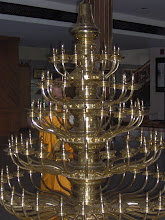There was a time when I viewed critique about the situation of Muslims in India by non-Indian Muslims (esp. if they have connection to a country the name of which starts with the alphabet "P":-)))with a great deal of irritation. But over time, I have realised that: 1) there is no need to defend the indefensible and 2)Indian Muslims are not a monolith -the ugly sits with the beautiful.
No doubt, there are serious problems that Muslims face in India - most tragically exemplified by Gujarat, 2002. However, I don' think that the two nation theory is an answer to the problems Muslims faced in pre-independence India. I think that carving out countries because of inter-community problems is never going to be a solution. Also the partition movement was premised on the idea of a monolothic Muslim community and did not take into account inter-community schisms.
I would even argue that nothing destroyed Indian Islam (I am not talking of the piety of individual Muslims but of Muslims as a socio-political entity) like partition did. The migration of the North Indian Muslim intellectual elite meant that Indian Islam was deprived of a middle class that could have become the focal point for social transformation. The Muslims who chose to remain in India would forever be tarred with having divided the country. Now I am from the south. I read somewhere (maybe Ashutosh Varshney) that in South India the vaishya caste (i.e. the Hindu caste for merchants) is largely absent and this space was occupied by Muslims. I am assuming that merchants would not be as invested in social advancement as a group of scholars and thinkers would be and I would even say that merchants as a group would favour the status quo.
So partition meant that India lost what could potentially have been a force for change in the community. In some ways, South Indian Muslims are today trail blazers for the rest of Muslims in India because some sections of the community have become wealthy enough to be able to afford looking beyond the status quo. The influx of gulf money, while blamed for the ugly Mappilah baroque houses, also meant that community organisations and trusts were set up for advancing education and in recent times there is a great deal of interest in women's education, like never before. But we had to wait for 50+ years for this change to happen!
City Walk – Katra Bala Mal, Old Delhi
7 hours ago

5 comments:
Gud to see you back.
Salaam,
As a Pakistani it's often difficult to talk about Partition with Indian friends. Thank you for your insights.
Warmly,
Baraka
thanks indiscribe:-) I will try to post more regularly.
Baraka, you are right, it is indeed difficult. Have you watched Satyu's "garam hawa"? I haven't but I am told it is one of the best protrayals of the travails of a Muslim family during partition.
No I haven't - I'll have to look out for it. I have seen "Earth", read "Train to Pakistan" and seen "Khamosh Pani" too which are all quite good.
Though it's painful, it's necessary to record the experiences of the people who lived through it - we have to know our shared history.
On the Pakistan side it's too easy to say, "A safe homeland was worth the bloodshed" because we often cannot even grasp the magnitude of the killing and migrations.
And we must record quickly as many of that generation are much older now. I believe there are projects in India to record stories but I haven't heard of any in Pak as yet.
Warmly,
Baraka
Dear Baraka,
You are right about recording these stories for posterity.
I have to say though that there was a lot of interest in oral history projects in India 10 years back when we were celebrating the 50th anniversary. It is my impression that apart from sporadic attempts here and there, there is nothing systematic going on. I hope I am wrong.
Post a Comment